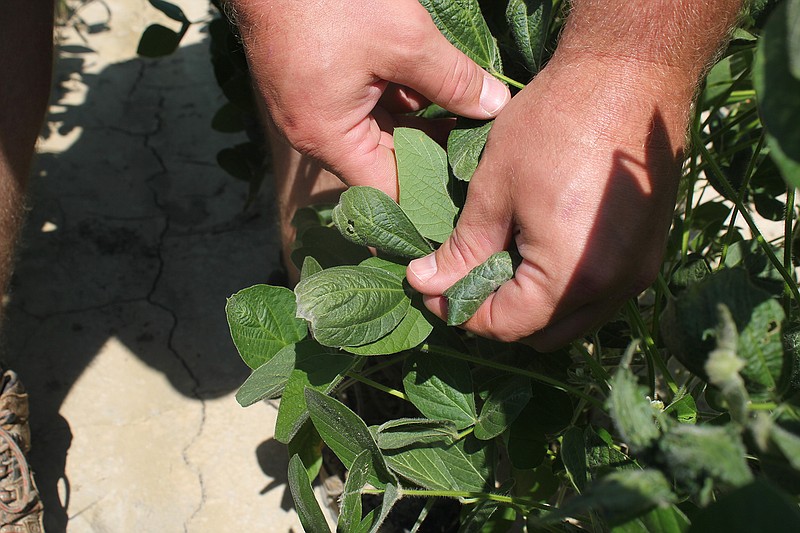The state Plant Board voted Monday to reject a June 12 cutoff date for spraying the herbicide dicamba proposed by the U.S. Environmental Protection Agency.
The current cutoff date for spraying in Arkansas is set for June 30.
A year ago, the EPA approved label amendments further restricting the use of over-the-top dicamba in Minnesota and Iowa to reduce risk of volatility and herbicide drift; the revised labeling prohibited application on dicamba-tolerant crops after June 30 in Iowa and Minnesota and after June 12 in parts of Minnesota, according to an EPA news release in March 2022.
Dicamba weedkillers are not hazardous to crops modified to withstand it, but some farmers have complained for years that under certain conditions dicamba drifts from neighbors' fields where it is sprayed, damaging nearby crops, trees and gardens not tolerant to the herbicide.
Arkansas Department of Agriculture Chief Counsel Wade Hodge said Monday that the state was informed about a dicamba cutoff date change proposed by the EPA last fall.
Hodge said there were communications between the department and the EPA last year regarding label discussions between the EPA and dicamba manufacturers that the department was told to keep "strictly confidential" at the time.
"At no time was the department ever informed by the EPA that this new label proposal was what you might call an 'opt-in' or 'opt-out' in other words. It was going to be for a few states only," Hodge said.
"We were under the impression that [the] EPA and the manufacturers were in discussions regarding a nationwide label, and we were never told that unless we filed a specific objection that that would be considered a tacit agreement to the proposal."
"So now we've been informed that a June 12 cutoff date for five states is proposed, and we've been told that we are one of those states because we did not object," Hodge continued.
The Plant Board sets dates during the year for when dicamba spraying can start and when it must end each growing season.
At Monday's online-only, special meeting, board Secretary Sam Stuckey made a motion that the Plant Board not accept the EPA's proposed cutoff date and keep the June 30 cutoff date and current state rules regarding dicamba use in Arkansas agriculture.
The motion passed unanimously with seven votes.
A second motion was then made by board member Nathan Reed requesting that the EPA adopt the Arkansas rules on dicamba use as part of the federal label for Arkansas only and that it include the state's current cutoff date and any other state dicamba-related requirements. That motion failed 5-2.
Of 19 total members allowed to sit on the Plant Board, 10 members must be in attendance to form a quorum and conduct board business, meaning every current member of the board must attend each meeting to pass measures.
Of eight voting members, five votes are needed to pass anything; there are two nonvoting members on the Plant Board who represent the University of Arkansas System Division of Agriculture, Plant Board Chairman Matthew Marsh said in August.
Marsh said last year the board was advised a recusal would not allow the board to have a quorum, while an abstention would maintain a quorum.
All Plant Board members attended Monday's meeting, allowing for a quorum.
Plant Board Staff Director Scott Bray said in August that dicamba damage complaints have been declining but noted farmers may be reporting them less often.
There were 317 pesticide complaints as of August 2022, 181 of which were alleged dicamba damage, according to Arkansas Department of Agriculture data.
In 2021, the department received 565 pesticide complaints, 360 of which were alleged dicamba damage; in 2020, there were 137 cases of confirmed dicamba damage.
The Plant Board previously voted 9-5 to adopt a rule change in May 2021 to extend the cutoff date for farmers to use dicamba over the top of dicamba-tolerant cotton and soybeans through June 30; the cutoff date had been May 25.
That vote came after a two-hour public hearing and a two-hour board meeting via Zoom.
The June 30 cutoff date was approved by state lawmakers a few days later, hours after the state Supreme Court ordered the removal of nine members on the Plant Board in a ruling related to legal challenges over dicamba use, according to the Associated Press reports.
